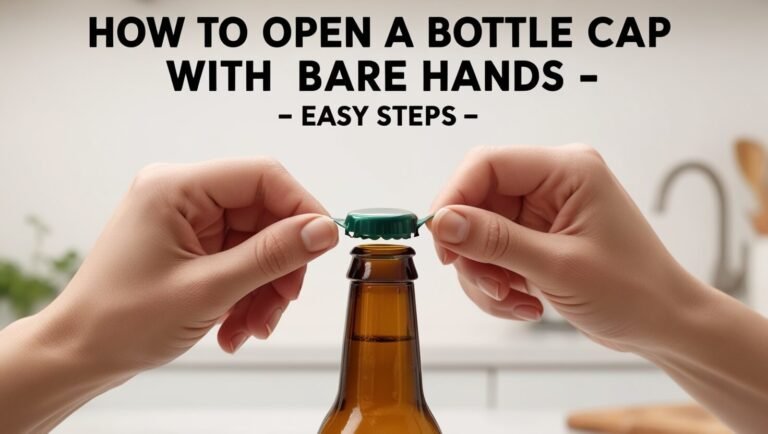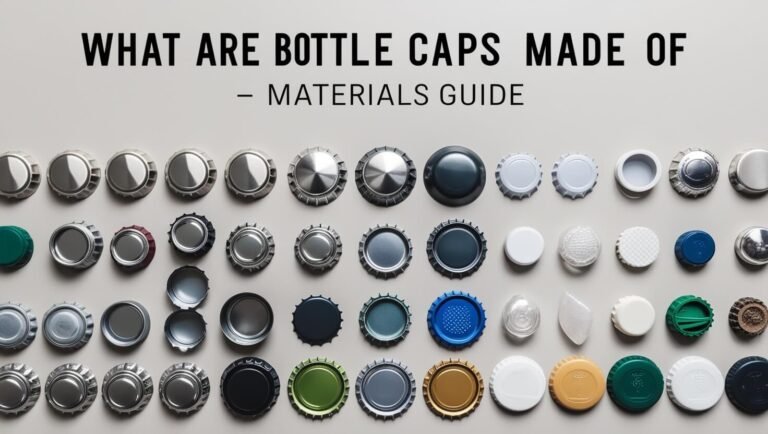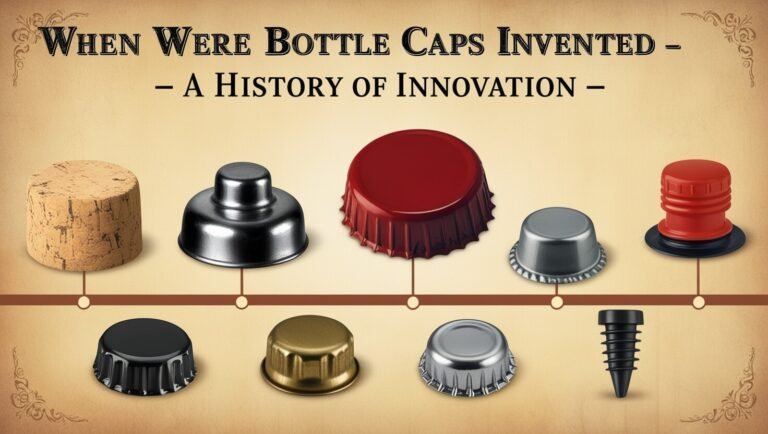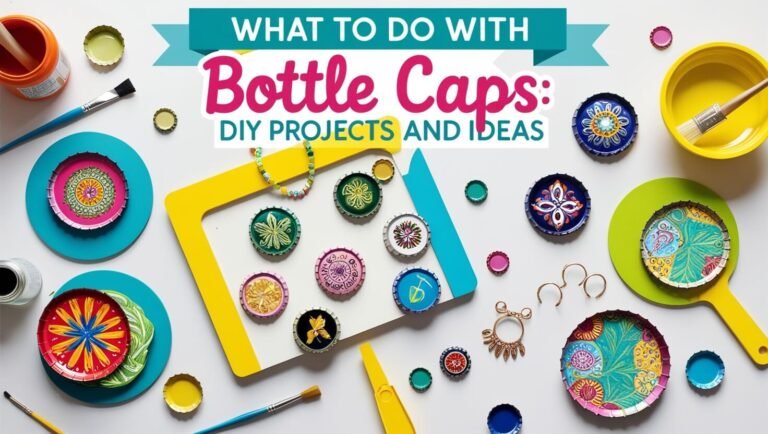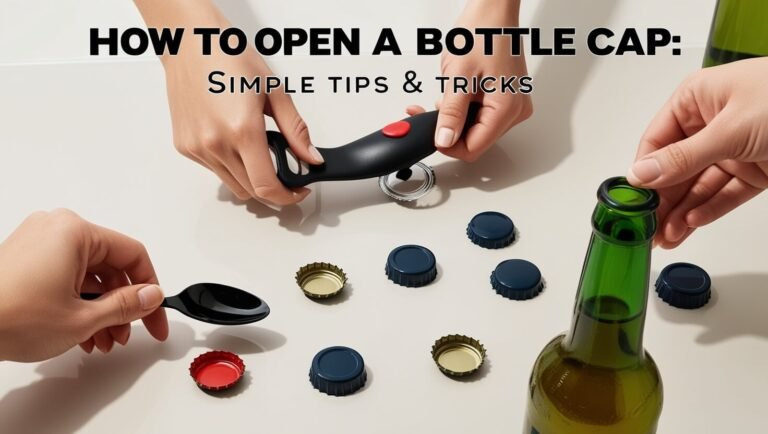Why Do I Chew on Bottle Caps – Understanding Habits
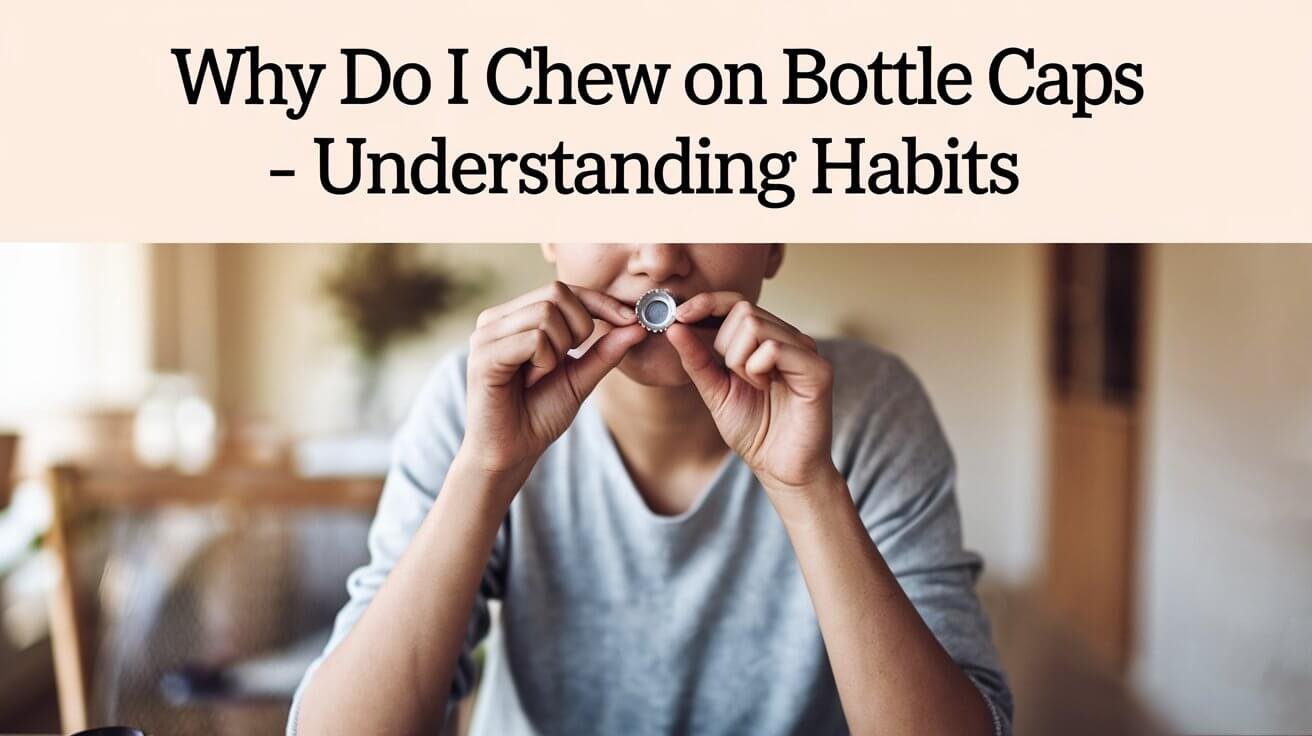
Ever found yourself chewing on a bottle cap or pen without thinking? You’re not alone. This habit is common among all ages, from kids to adults. But why do we do it? Let’s explore the reasons behind chewing on bottle caps and other objects.
The Science Behind Bottle Cap Chewing
Chewing on bottle caps might seem harmless, but it’s actually quite interesting. It gives the jaw proprioceptive input, which calms and organizes the brain. This sensory input makes the jaw and neck muscles work, giving a sense of stability. It helps block distractions and improves focus.
Neurological Response to Oral Stimulation
Chewing sets off a chain of neurological events. The motion stimulates the trigeminal nerve, sending signals from the face and jaw to the brain. This helps regulate the nervous system, possibly lowering stress and anxiety.
Chemical Reactions in the Brain During Chewing
Chewing sparks chemical reactions in the brain. It releases dopamine, linked to pleasure and reward. It also boosts serotonin, a mood regulator and stress reliever. These chemical reactions calm and soothe the brain.
Physical Benefits and Risks
Chewing has benefits like better focus and stress relief. But chewing on bottle caps can harm teeth and mouth tissues. It might cause jaw pain, muscle tension, and dental problems. It’s key to weigh the benefits against the risks.
| Potential Benefits of Chewing | Potential Risks of Chewing on Bottle Caps |
|---|---|
| Improved focus and concentration Reduced stress and anxiety levels Calming and organizing effect on the nervous system | Damage to tooth enamel Irritation to oral tissues Jaw pain and muscle tension Other dental issues |
Common Triggers for Bottle Cap Chewing Behavior
Chewing on bottle caps is a common habit. It often happens when we’re stressed, frustrated, tired, or anxious. This behavior gets worse as our stress levels go up and we feel less able to handle it.
Young kids love to explore the world by putting things in their mouths. This is normal for them. But kids with sensory processing disorders, like autism or ADHD, might keep doing it even when they’re older.
Chewing can be calming for those who feel overwhelmed. It gives the brain a sense of grounding. Finding out why a child chews can help parents find ways to stop it. This can help with anxiety relief and stress management.
To cut down on chewing, try giving them chewy toys or jewelry. Also, get them moving with activities. And offer foods that are crunchy or chewy. This way, they can find better ways to deal with anxiety and stress.
| Trigger | Potential Causes | Recommended Strategies |
|---|---|---|
| Stress | – Overwhelming or new situations – Feeling anxious or overwhelmed | – Calming activities (deep breathing, mindfulness) – Sensory-based toys or tools (chew toys, fidgets) |
| Boredom | – Lack of stimulation or engagement – Need for sensory input | – Engaging activities (movement, crafts) – Providing appropriate chewing options |
| Sensory Processing Issues | – Underresponsiveness to oral sensations – Seeking deep pressure input | – Sensory diet activities – Chewing tools and aids |
Stress and Anxiety: The Connection to Oral Fixation
Chewing on bottle caps can be a way to deal with fight or flight stress reaction. It’s like how babies calm themselves by mouthing and sucking. For adults, chewing can be a way to soothe themselves when they’re stressed or anxious. It’s a way to try and regulate their emotional state and feel more in control.
Emotional Regulation Through Chewing
Studies show a link between chewing and managing stress and anxiety. The act of chewing can calm the body, lowering heart rate and cortisol levels. It gives a tactile feeling and a way to release nervous energy, helping with emotional control.
Stress Management Alternatives
- Try deep breathing exercises to relax and calm the nervous system.
- Do regular physical activities like walking, jogging, or yoga to release tension and feel better.
- Use chew jewelry made of silicone or rubber as a safe way to satisfy the urge to chew.
By tackling the emotional regulation and stress response needs, people can find better ways to handle their urge to chew on bottle caps. This can lead to a better overall well-being.
Why Do I Chew on Bottle Caps: Psychological Perspectives
Chewing on bottle caps can be linked to anxiety, stress, and sensory issues. For some, it’s a way to find anxiety relief or cope with psychological factors. This habit might help them feel better overall.
Some people chew on bottle caps because they have oral hyposensitivity. This means they don’t feel much in their mouths. They chew to get more sensory input, which can give them a temporary relief or satisfaction.
Others chew on bottle caps because they’re bored or need to focus. The action and feeling of chewing can help them concentrate. It’s helpful during stressful or anxious times.
“Chewing on bottle caps can be a coping mechanism for individuals who struggle with anxiety, stress, or sensory processing challenges. It provides a sense of control and a way to self-regulate their emotions.”
It’s important to understand why people chew on bottle caps. Knowing the reasons helps find better ways to manage this behavior. This way, they can find healthier ways to deal with their compulsive behavior and anxiety relief.
The Role of Sensory Processing in Chewing Habits
Sensory processing is key to understanding why some people chew on things like bottle caps. It involves proprioception and oral sensory seeking. These factors explain why this habit is so common.
Proprioceptive Input Benefits
Proprioception helps us know where our body is in space. Chewing can improve this sense. Studies show that some people with learning disabilities chew on non-food items like cigarette butts.
For those with sensory processing disorders, chewing can be calming. It helps organize their nervous system.
Oral Sensory Seeking Behavior
Oral sensory seeking is common in babies as they explore the world. But, kids with sensory issues might keep doing it to feel calm. While it helps them relax, it can also cause problems like zoning out or getting bullied.
Every child with sensory processing challenges reacts differently to touch and taste. Some avoid it, while others, like the author’s child, seek it out. This can lead to health issues.
Health Risks Associated with Plastic Ingestion
Chewing on plastic bottle caps can lead to swallowing small plastic pieces. Studies show we unknowingly eat about 16,000 microplastic particles a year from bottled water. This shows how common plastic contamination is in our lives.
It’s not just bottled water. A study found 93% of bottled water bottles have microplastics. Bottled water has 60 times more microplastics than tap water. These tiny plastics are found in our lungs, breast milk, and even in the womb.
The health risks of plastic ingestion are serious. Chemicals in microplastics can harm our hormones and reproductive systems. They can also carry pollutants and germs, making them dangerous.
| Statistic | Explanation |
|---|---|
| 16,000 microplastic particles | Estimated annual consumption from bottled water alone |
| 93% of bottled water bottles | Found to contain microplastics in a 2018 study |
| 60 times more microplastics | Bottled water contains compared to tap water |
Chewing on hard plastic can also harm our teeth and gums. This shows why we need to stop this habit. We should find safer ways to avoid the dangers of plastic ingestion.
From Childhood to Adulthood: Evolution of Chewing Habits
Oral fixation is when people need to keep their mouth busy. It starts in infancy as a normal part of growing up. But, some people keep needing this oral stimulation even as adults.
Developmental Stages of Oral Fixation
Young children often put things in their mouths. This is called mouthing. By age two, most kids stop this habit. But, some kids might keep doing it longer.
Children who are developmentally delayed might mouth things like younger kids do. This is because they are exploring the world in their own way.
Adult Coping Mechanisms
As people get older, their oral development and chewing habits change. Adults who need to keep their mouth busy might chew gum or use chew tools. These habits help them feel satisfied without chewing on things they shouldn’t.
It’s important to understand how oral fixation changes over time. Knowing how adults cope with this need helps them find healthy ways to manage it.
Safe Alternatives to Bottle Cap Chewing
Are you tired of constantly replacing your water bottles because your pet chews on the caps? Don’t worry! There are safe and effective alternatives to meet your pet’s chewing needs without the risk of harmful plastics.
One great option is chew tools made just for pets. “Grabbers,” “Y-Chews,” and chewable pencil toppers come in different toughness levels. These toys give your pet a safe way to chew, without the dangers of non-food items.
Another excellent choice is chewable jewelry, or “chewelry.” These accessories let your pet chew while on the move, without fear of swallowing harmful materials. With many styles and textures, you’ll find the perfect chewelry for your pet.
Remember, it’s key to provide safe chewing options for your pet’s health. By introducing these alternatives, you can avoid stomach problems or other issues from non-food items.
“Investing in the right chew tools and chewelry can make all the difference in addressing your pet’s oral stimulation needs safely and effectively.”
Keeping your pet happy and healthy is your main goal. Look into the many oral stimulation alternatives out there. Find the best solution for your pet’s chewing habits.
The Connection Between Oral Fixation and Focus
Chewing can help improve concentration and focus. It activates brain areas linked to attention and memory. This helps block distractions and keeps the mind focused.
Research shows chewing gum or pen caps boosts cognitive performance. Chewing stimulates the vagus nerve, which controls digestion, immune response, and mood. This makes chewing great for those with ADHD, who often have trouble focusing.
- Chewing can calm the mind and lower stress, leading to better concentration.
- The act of chewing can be soothing, helping to focus and manage emotions.
- Safe chewing habits are better than chewing on clothes or other harmful items.
If you struggle to stay focused, try chewing safely. Options like gum or oral stimulation tools can help. They tap into the focus-enhancing power of oral fixation.
When to Seek Professional Help
If you find yourself unable to stop chewing bottle caps, it’s time to get help. This habit can interfere with your daily life and even harm your teeth. If you can’t stop, even when you want to, it’s a sign you need help.
Chewing compulsively might be linked to anxiety or sensory issues. In these cases, seeking professional help is key. They can help you find the cause and teach you new ways to cope.
Signs of Compulsive Behavior
- Inability to stop chewing, even when you want to
- Chewing interferes with daily activities and responsibilities
- Chewing causes physical harm, such as damaged teeth or mouth injuries
Treatment Options Available
There are many ways to treat compulsive chewing with professional help:
- Behavioral Therapy: A therapist can help you find out why you chew and teach you how to stop.
- Occupational Therapy: An occupational therapist can address sensory issues and provide tools to replace chewing.
- Counseling or Medication: If anxiety or stress is causing your chewing, counseling or medication might help.
Working with a healthcare provider is important. They can help you understand why you chew compulsively. Together, you can create a plan to stop and stay healthy.
Final Thoughts
Stopping the habit of chewing on bottle caps needs a mix of strategies. It’s important to understand why we do it and find better ways to handle it. This habit can harm our teeth and overall health because of the tiny plastic bits we swallow.
First, we need to figure out what makes us chew on bottle caps. It might be stress, anxiety, or other issues. Then, we can try safer things to chew on instead. If needed, getting help from a professional can offer great advice and plans to stop this habit.
Changing this habit takes knowing ourselves, planning, and caring for our health. By choosing wisely and using good habits, we can control our urge to chew on bottle caps. This leads to a healthier life. It’s all about using habit management, oral fixation solutions, and healthy alternatives to overcome this habit.


